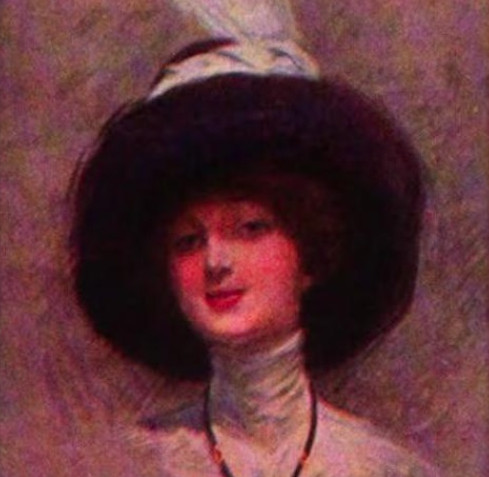Lucy Maud Montgomery? Adelaide Anne Procter? Walt Whitman? Apocryphal?

Question for Quote Investigator: The popular Canadian author Lucy Maud Montgomery is best known for the children’s novel “Anne of Green Gables”. Apparently, she once made a powerful statement about transience, mortality, and memory:
Nothing is ever really lost to us as long as we remember it.
Numerous webpages claim that this quotation appeared in Montgomery’s 1911 novel “The Story Girl”, but I have carefully searched that novel, and the quotation is absent. Would you please help to find a correct citation?
Reply from Quote Investigator: The quotation did not appear in “The Story Girl”; however, it did appear in the 1913 sequel by Lucy Maud Montgomery titled “The Golden Road”. Both works featured a character named Sara Stanley who was referred to as the Story Girl. The quotation was spoken by her father who was discussing Sara’s departed mother. Boldface added to excerpts by QI:1
“She was as slim and lithe as a young, white-stemmed birch tree. How I loved her! How happy we were! But he who accepts human love must bind it to his soul with pain, and she is not lost to me. Nothing is ever really lost to us as long as we remember it.”
Below are additional selected citations in chronological order.
In 1859 the poet Adelaide Anne Procter published “The Ghost in the Picture Room”. The poem contained a couplet that was thematically pertinent to this topic:2
No star is ever lost we once have seen,
We always may be what we might have been.
A poem by Walt Whitman titled “Continuities” presented a thematically related point about cosmic persistence. The poem appeared in the journal “Current Literature” in 1888.3
The poem later appeared in an edition of the famous collection “Leaves of Grass”:4
CONTINUITIES.
[From a talk I had lately with a German spiritualist]Nothing is ever really lost, or can be lost,
No birth, identity, form—no object of the world.
Nor life, nor force, nor any visible thing;
Appearance must not foil, nor shifted sphere confuse thy brain.
Ample are time and space—ample the fields of Nature.
The body, sluggish, aged, cold—the embers left from earlier fires,
The light in the eye grown dim, shall duly flame again;
The sun now low in the west rises for mornings and for noons continual;
To frozen clods ever the spring’s invisible law returns,
With grass and flowers and summer fruits and corn.
In 1913 the quotation under examination appeared in “The Golden Road” as mentioned previously.
In 2008 the quotation appeared on the website Goodreads, but the accompanying attribution pointed to the wrong novel:5
“Nothing is ever really lost to us as long as we remember it.”
― L.M. Montgomery, The Story Girl
In 2015 “How to Cope: The Welcoming Approach to Life’s Challenges” by Dr. Claire Hayes employed the quotation as a chapter epigraph:6
Nothing is ever really lost to us as long as we remember it.
—L. M. MONTGOMERY
In conclusion, Lucy Maud Montgomery deserves credit for this quotation which appeared in 1913 novel “The Golden Road”. The quotation did not appear in “The Story Girl”. “The Golden Road” was a sequel to “The Story Girl”, and both featured a character named Sara Stanley who was referred to as the Story Girl.
Image Notes: Portrait of Sara Stanley from the frontispiece of the novel “The Golden Road” by Lucy Maud Montgomery. Image has been cropped and resized.
Acknowledgement: Great thanks to Eric Berlin whose twitter thread highlighted the quotation. He noticed that the common attribution to “The Story Girl” was incorrect. Also thanks to Andrew M. Greene who suggested contacting the Quote Investigator.
Update History: On March 15, 2025 the format of the bibliographical notes was updated.
- 1913 Copyright, The Golden Road by L. M. Montgomery (Lucy Maud Montgomery), Chapter 27: The Old Order Changeth, Quote Page 320, The Page Company, Boston, Massachusetts. (Google Books Full View) link ↩︎
- 1859 December 13, All the Year Round: A Weekly Journal, Conducted by Charles Dickens, (The Haunted House: The Extra Christmas Number of All the Year Round. Containing the amount of two ordinary numbers, Christmas 1859), The Ghost in the Picture Room by Adelaide Anne Procter, Start Page 19, Quote Page 21, Column 2, Published at Number 11, Wellington Street North, London. (Google Books Full View) link ↩︎
- 1888 August, Current Literature: A Magazine of Record and Review, Volume 1, Number 2, Continuities—Walt Whitman—New York Herald, Quote Page 121, Column 1, The Current Literature Publishing Company, New York. (Google Books Full View) link ↩︎
- 1912, Leaves of Grass by Walt Whitman, Section: Sands At Seventy, Continuities, Quote Page 396, D. Appleton and Company, New York. (Google Books Full View) link ↩︎
- Website: Goodreads, Article title: L.M. Montgomery > Quotes > Quotable Quote, Timestamp on first ‘Like’: June 24, 2008, Website description: Goodreads is a large community for readers that provides book recommendations; the site is owned by Amazon. (Accessed goodreads.com on August 26, 2022) link ↩︎
- 2015, How to Cope: The Welcoming Approach to Life’s Challenges by Dr. Claire Hayes, Chapter 10: Loss, Quote Page 129, Gill & Macmillan, Dublin, Ireland. (Verified with scans) ↩︎